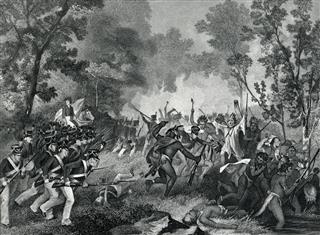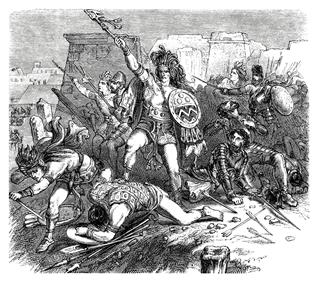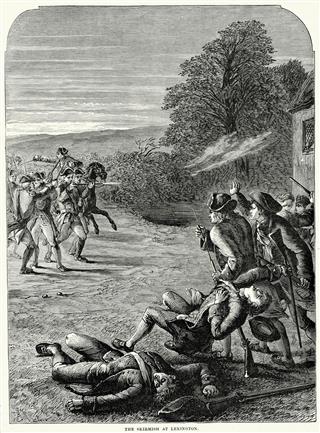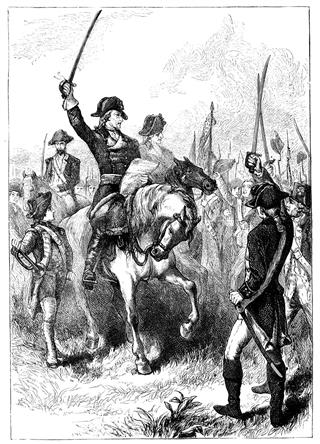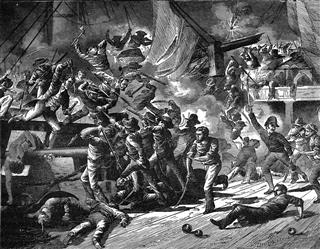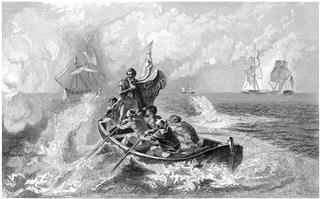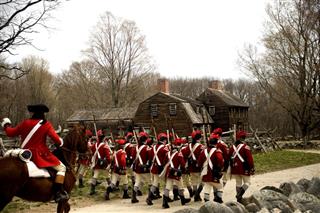
The American revolution was a blessing in disguise for many African-Americans, as it paved the way to freedom from slavery, and helped them to embark on a journey towards equality and civil rights.
We know America as a land of opportunity, as a nation that opened its doors to all, giving them a chance to achieve their potential, whether commercial, artistic or religious. Freedom is one of the basic tenets of the American dream. Yet, it was not always so. The United States was, at one time, fighting for these very rights, as a conglomerate of 13 colonies under the British empire.
The American war of independence, which began with the rebellion of the colonies in 1774 and ended with the signing of the peace treaty between the two forces in 1783, saw both white and black Americans fight together for freedom, even though the latter were treated as slaves and not allowed to serve in the army.
African-American historian Benjamin Arthur Quarles (1904-1996) wrote many books and articles about the dynamics between African-American slaves fighting in the revolutionary war and their white counterparts. He understood the African-American community’s need for equality and freedom, when he summed it up in the following words – “I realized that loyalty, was not to a place or a people, but to a principle”.
Around 5,000 African-Americans served as soldiers in the Continental Army and about 20,000 in the British Army. Those who remained loyal to the American side were termed Black Patriots, whereas the British supporters were known as Black Loyalists.
African-Americans served as soldiers, guides, messengers and spies for both, the Continental and British armies. They proved to be honest and brave soldiers, despite many misgivings on the part of the predominantly white southern states, such as arming slaves with weapons and granting them freedom in exchange for military service. Following is a brief of some of the African-American revolutionaries during the war.
The Patriots
Crispus Attucks
Attucks is considered as the first martyr of the American Revolution. In March, 1770, a fight broke out between the British soldiers and a crowd of American colonists among whom, was an African-American, Crispus Attucks. In the attack, a British soldier was struck on the head with a stick, which historians think was wielded by Attucks himself. Panicked, the soldiers fired their muskets at the crowd, killing Attucks and five other people instantaneously.
Attucks was buried as a hero in the Granary Burying Ground. He is one the few martyrs of what was termed, by Samuel Adams, as theBoston Massacre, who is still remembered for his bravery and patriotism.
Colonel Louis Cook
Louis Cook fought against the British army and it was George Washington, Commander-in-Chief of the Continental Army, who referred to him as “Colonel Louis”. He participated in many attacks on the British troops, sometimes leading from the front.
In March, 1778 he was sent by General Philip Schuyler to destroy British ships at Niagara. He received his commission from Continental Congress, as a Lieutenant Colonel in the Continental Army, and was the first and perhaps the only African-American to be awarded this high a rank, during the revolution.
Jack Sisson
Sisson played an important role in the capture of British General Richard Prescott, in July 1777. He was part of the forty, armed Continental soldiers led by Colonel William Barton who cut across British controlled waters, to sneak up on Prescott. Some accounts suggest he used his own head to break in Prescott’s door and capture him. He served as the pilot for one of the boats in this mission.
William Flora
Hailed as the hero of the Battle of Great Bridge, William Flora was a free African-American, who fought in the revolutionary war on the side of the American Patriots. During his historic stand against the British, he ripped up the planks of the bridge, while under heavy fire, to halt the progress of the redcoats. After the war he went on to set up a successful business, and made a small fortune.
James Armistead
Another famous African-American name in the revolution, James Armistead was a slave of William Armistead, and had been used by his owner as a substitute for army service in the war.
In 1781, he volunteered to spy on British forces, and applied to the American general Marquis de Lafayette. He was accepted and sent into the field, where he soon gained the confidence of the British general , Lord Cornwallis, and began informing the Americans about British troop movements. Many think him to be the world’s first double agent. His invaluable information helped the American forces win the Battle of Yorktown. In 1786, Armistead petitioned the Virginia assembly and was granted his freedom.
Oliver Cromwell
A veteran fighter of the American War of Independence, Oliver Cromwell was born in 1753 in Burlington County New Jersey, and grew up to be a farmer. He joined the Second New Jersey regiment and saw action in several historic battles at, Princeton, Brandywine, Monmouth and also the river crossing at Delaware on Christmas Day 1776. His discharge papers were signed by George Washington himself, and after the war he retired on a military pension and lived a long prosperous life.
Salem Poor
Called a brave and gallant soldier by a signed petition of 14 officers after his actions in the Battle of Bunker Hill, Salem Poor was born in Andover, Massachusetts, as a slave and bought his freedom in 1769 for a sum of 27 pounds. He married and had a son, but left his family to volunteer in the cause of the revolution, and fought at Saratoga and Monmouth and Bunker Hill. At this historic battle he shot and killed a lieutenant colonel of the British army. Salem Poor was honored with a stamp celebrating the United States’ Bicentennial in 1975.
Phillis Wheatley
Brought to America as a slave girl in 1761, Phillis Wheatley would go on to become the first African-American to publish a book, a collection of poetry, titled ‘Poems on Various Subjects, Religious and Moral (1773)’. She was encouraged in her efforts by the family of John Wheatley for whom she worked and was also set free in 1773. She published another volume of poetry, but her hardships were many and, unable to support her three children, she died at the age of 31, in 1784. Her work remains an inspiration for many African-American writers today.
The Loyalists
Many African-Americans also joined the British colonial forces after promises of freedom from slavery and relocation to new shores. It was in 1775 that Lord Dunmore, the last royal governor of the colony of Virginia, issued a royal decree granting freedom to slaves from their rebel masters, if they joined the sides of the British forces. This was known as ‘Lord Dunmore’s Proclamation’ and resulted in chaos, as many slaves, living in inhuman conditions on the plantations in the south, made a beeline for the British army.
The British did keep their end of the bargain and after the war as many as 3500 African-American Loyalists were evacuated to the frontier towns of Nova Scotia and later to Sierra Leone, Africa. Many thousands were however, caught by white landowners and sold back into slavery. Today, many African-Americans in Sierra Leone have traced their lineage back to the original settlers of Nova Scotia, with the help of the Book of Negroes, a list of evacuees maintained by the British.
Colonel Tye
Tye, was an African-American slave, born as Titus Cornelius and was a soldier in the British army. He was a Loyalist guerrilla leader, known for his tactical leadership skills, which earned him the honorary title of a ‘Colonel’. His first recorded military action was the capture of an American captain at the Battle of Monmouth in June 1778.
Tye attacked and assassinated many American leaders during the revolutionary war. All through 1779, he took prisoners and freed many slaves, seizing food and fuel from the American Continental army. Tye was fatally wounded in September 1780, by a musket ball. His tactical skills made it difficult for American forces to reclaim New York City from the clutches of British occupation.
Thomas Peters
Peters is one of the four founding fathers of Freetown, Sierra Leone. Born as a slave and sold numerous times, he managed to escape North Carolina with the British during the American Revolutionary War. He later joined the Black Loyalist Regiment and rising to the rank of a sergeant, was wounded twice in the battle against American forces.
After the war, Peters and many of his fellow soldiers traveled to Nova Scotia, Canada, with the British army. He then traveled to England, to further his cause for re-settlement of African-Americans in Sierra Leone, West Africa. He returned triumphant from London and managed to convince nearly 3,500 African-Americans, to move to Africa. Peters died a free man in 1792, in Freetown.
Boston King
Boston King is known for being one of the founders of Freetown, a small settlement in Sierra Leone. He was born as a slave in South Carolina, and grew up to be a carpenter. When the British forces moved in on Charleston, he heard of Lord Dunmore’s Proclamation and decided to join the army.
After the war he and his wife were sent to Nova Scotia and later, migrated to Sierra Leone. King was by then a Methodist minister and became the first missionary to Sierra Leone. He also wrote his biography which described his experiences in the war and trans-Atlantic resettlement .
Henry Washington
One of the slaves of the first American president, George Washington, Henry Washington took care of the famous leader’s horses at his Mount Vernon residence. He also tried to escape but was always recaptured. Henry got his break to freedom in 1776 with Lord Dunmore’s Proclamation and joined his Ethiopian regiment near New York.
He remained a African-American Loyalist throughout the war, and later settled in Nova Scotia with his wife and children. He took the opportunity to emigrate to his native country and left for Sierra Leone, sometime in 1791. There too, Henry Washington took part in a rebellion against the mistreatment of the Sierra Leone company and upheld the spirit of freedom and equality.
African-Americans, who fought for the British troops were recognized for their bravery and strength. They were also instrumental in the Continental army’s win against the Britishers. Although they were not immediately given their due rights of freedom and equal citizenship, it ushered them into an era where they could not be stopped from fighting for their place in the world.
